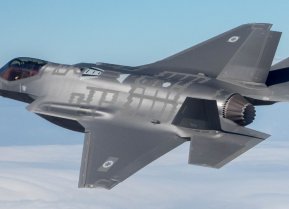Israel Sent Its 'One of a Kind' F-35I Fighters to America to 'Fight'
Perhaps the most critical alteration the Adir fighter possesses is its electronic warfare system (ESW). The F-35I sports domestically-produced sensors and countermeasures, along with Israeli-made helmet-mounted displays and other data-gathering and processing capabilities.
In March and over 12 days, the U.S. Air National Guard, Marine Corps, and the Israeli Air Force participated in the latest installment of the Red Flag-Nellis combat training exercise.
Designed to improve capabilities and strengthen alliances between U.S. European and Central Command warfighters, the inclusion of Israeli F-35I Adir airframes was significant.
In the exercise, over 2,000 targets, an opposing enemy force, and realistic threat systems helped prepare both U.S. and Israeli pilots “to fly, fight and win together.”
Regarding the military training exercise, USAF 414th Combat Training Squadron commander colonel Jared Hutchinson said that “The Israeli F-35 participation in Red Flag 23-2 is another step forward for America and its allies in the transition to the next level of air warfare,” adding that “It’s a rare opportunity for warfighters from both countries to integrate our most advanced capabilities. As the Fifth-Generation Center of Excellence, Nellis AFB is uniquely capable of hosting allied F-35 units on the ground and challenging them in the air.”
How Did Israel Acquire F-35 Fighters?
In the early 2000s, the Israeli Air Force began to seek a replacement for its aging fleet of F-16 Fighting Falcon airframes.
Israel became the first foreign customer to purchase the American-made F-35 Lightning II back in 2010 when the fighter’s nine-nation co-development group gave the Jewish state the green light to procure a specially modified variant of the jet.
This deal was significant considering the Pentagon had refused to incorporate even the slightest foreign changes to F-35 export batches in the past.
The Lockheed Martin-designed airframe is widely recognized as the most formidable fighter to ever fly the skies. However, Israel’s unique F-35I “Adir” variant may actually top the U.S. version.
What Makes the Adir Variant Special?
Perhaps the most critical alteration the Adir fighter possesses is its electronic warfare system (ESW). The F-35I sports domestically-produced sensors and countermeasures, along with Israeli-made helmet-mounted displays and other data-gathering and processing capabilities.
This advanced electronics suite is paramount for Israel since it could use its capabilities to effectively jam the electronics and guidance systems of adversarial ground-fired anti-aircraft weapons.
The IAF also gained access to certain components of the F-35’s highly digitized architecture, including communications systems, mission control hardware, and the integration of its own weapons.
Israel’s desire to have both operational and developmental independence with its fleet of Adir fighter stems from wanting protection in case of a cyber-attack targeting the F-35, according to Eurasian Times.
American and Israeli F-35s Often Train Together
Two Israeli Air Force squadrons fly the F-35I Adir, including the 116thLions of the South Squadron and the 140thGolden Eagle Squadron based at Nevatim Base. The IAF also utilizes additional Adir airframes for training purposes.
Israel’s participation in the recent Red Flag-Nellis training exercise further emphasizes the importance of U.S.-Israeli collaboration. In January, the IDF (including the IAF) joined CENTCOM to carry out training drills in Exercise Juniper Oak 23.2.
While this series of exercises incorporated joint training on land, in the air, and at sea, the IAF’s fleet of F-35I Adirs stood out as powerhouses in the skies.
Maya Carlin is an analyst with the Center for Security Policy and a former Anna Sobol Levy Fellow at IDC Herzliya in Israel. She has by-lines in many publications, including The National Interest, Jerusalem Post, and Times of Israel.
Image Credit: Creative Commons/IDF.


